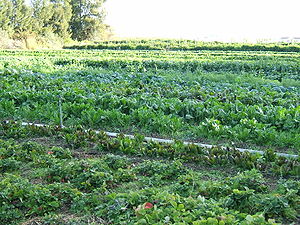Transgenics
|
Transgenic ![-]() - Farm, Food, Bio, Fertilizer, Organic and Natural Products
- Farm, Food, Bio, Fertilizer, Organic and Natural Products
|
| Transgenic
- Farms, Foods, Fertilizers, Organic and Natural Products
|
| Farm Transgenic : Organic vs Conventional -
|
| Genetically modified organisms - Transgenic - A key characteristic of organic farming is its rejection of genetically engineered products, including plants and animals. On October 19, 1998, participants at IFOAM's 12th Scientific Conference of IFOAM) issued the Mar del Plata Declaration, where more than 600 delegates from over 60 countries voted unanimously to exclude the use of genetically modified organisms in food production and agriculture. From this point, it became widely recognized that GMOs are categorically excluded from organic farming.
|
| GMO-free : is also a popular marketing point for organic food. The general argument against is that no one has a clue as to the full impact of genetic engineering on food quality, plant or animal health: GE could be preparing our food supply for collapse. On the other side, the argument is that with a rapidly expanding global population, genetic engineering to create higher volumes of produce could be the key to ending world hunger.
|
| It also could be the key to creating healthier food, and ensuring proper nourishment, and has the potential to make farming more profitable, allowing agricultural industries to survive in increasingly service oriented economies. Often overlooked in this debate is the fact that genetic engineering is a technique, not an essential characteristic of the organisms it produces, and that humans have used selective breeding to modify crops and livestock for tens of thousands of years.
|
| The contamination of organic farms with GM product, usually through pollination, is an important issue. Contamination may lead to products being incorrectly labelled as organic or GMO-free, or may reduce the value of crop as it cannot be sold as organic, leading to losses for the farmer.
|
| The mechanism of cross-contamination is not understood, and only beginning to be studied. Meanwhile, cases of cross-contamination have been documented, while the extent is still unclear. A first-time study of genetic cross-contamination, found that at least two-thirds of conventional corn, soybeans and canola in the US contain traces of genetic material from GM varieties.
|
| UCSUSA study of genetic cross-contamination, published in Feb. 2004
|
| Along with commercial GM crops, trials for new GM plants producing food, pharmaceuticals (pharmacrops) and industrial materials (eg: plastics), are being conducted in the US, Canada, and elsewhere. With the genetic engineering of alfalfa (not yet widely grown), a primary green manure fertilizer crop, not only primary crops, but the underpinnings of organic agriculture are threatened. It is conceivable that genetic contamination could make GMO-free farming next to impossible.
|
| Farm Methods Organic and Conventional
|
| Certified
|
| Transgenic
|
| Farm History
|
| Farms
|
 - Farm, Food, Bio, Fertilizer, Organic and Natural Products
- Farm, Food, Bio, Fertilizer, Organic and Natural Products